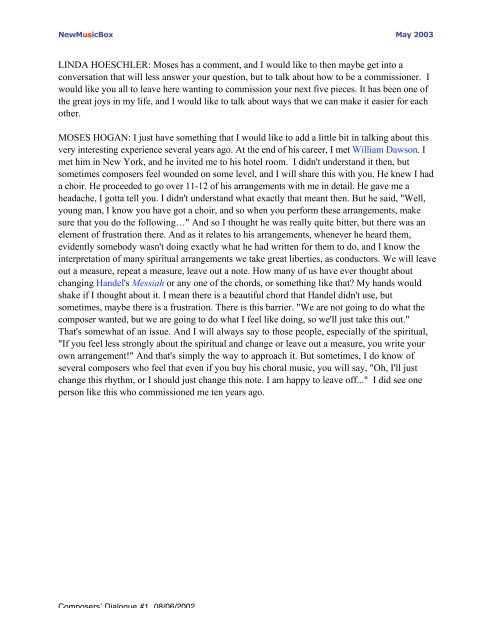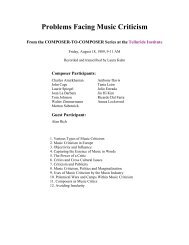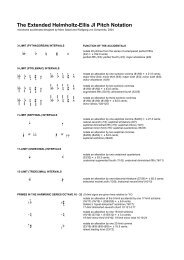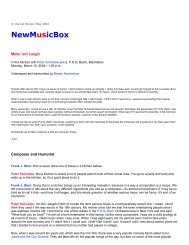Sixth World Symposium on Choral Music ... - NewMusicBox
Sixth World Symposium on Choral Music ... - NewMusicBox
Sixth World Symposium on Choral Music ... - NewMusicBox
Create successful ePaper yourself
Turn your PDF publications into a flip-book with our unique Google optimized e-Paper software.
New<strong>Music</strong>Box May 2003<br />
LINDA HOESCHLER: Moses has a comment, and I would like to then maybe get into a<br />
c<strong>on</strong>versati<strong>on</strong> that will less answer your questi<strong>on</strong>, but to talk about how to be a commissi<strong>on</strong>er. I<br />
would like you all to leave here wanting to commissi<strong>on</strong> your next five pieces. It has been <strong>on</strong>e of<br />
the great joys in my life, and I would like to talk about ways that we can make it easier for each<br />
other.<br />
MOSES HOGAN: I just have something that I would like to add a little bit in talking about this<br />
very interesting experience several years ago. At the end of his career, I met William Daws<strong>on</strong>. I<br />
met him in New York, and he invited me to his hotel room. I didn't understand it then, but<br />
sometimes composers feel wounded <strong>on</strong> some level, and I will share this with you. He knew I had<br />
a choir. He proceeded to go over 11-12 of his arrangements with me in detail. He gave me a<br />
headache, I gotta tell you. I didn't understand what exactly that meant then. But he said, "Well,<br />
young man, I know you have got a choir, and so when you perform these arrangements, make<br />
sure that you do the following…" And so I thought he was really quite bitter, but there was an<br />
element of frustrati<strong>on</strong> there. And as it relates to his arrangements, whenever he heard them,<br />
evidently somebody wasn't doing exactly what he had written for them to do, and I know the<br />
interpretati<strong>on</strong> of many spiritual arrangements we take great liberties, as c<strong>on</strong>ductors. We will leave<br />
out a measure, repeat a measure, leave out a note. How many of us have ever thought about<br />
changing Handel's Messiah or any <strong>on</strong>e of the chords, or something like that? My hands would<br />
shake if I thought about it. I mean there is a beautiful chord that Handel didn't use, but<br />
sometimes, maybe there is a frustrati<strong>on</strong>. There is this barrier. "We are not going to do what the<br />
composer wanted, but we are going to do what I feel like doing, so we'll just take this out."<br />
That's somewhat of an issue. And I will always say to those people, especially of the spiritual,<br />
"If you feel less str<strong>on</strong>gly about the spiritual and change or leave out a measure, you write your<br />
own arrangement!" And that's simply the way to approach it. But sometimes, I do know of<br />
several composers who feel that even if you buy his choral music, you will say, "Oh, I'll just<br />
change this rhythm, or I should just change this note. I am happy to leave off..." I did see <strong>on</strong>e<br />
pers<strong>on</strong> like this who commissi<strong>on</strong>ed me ten years ago.<br />
Composers’ Dialogue #1, 08/06/2002





